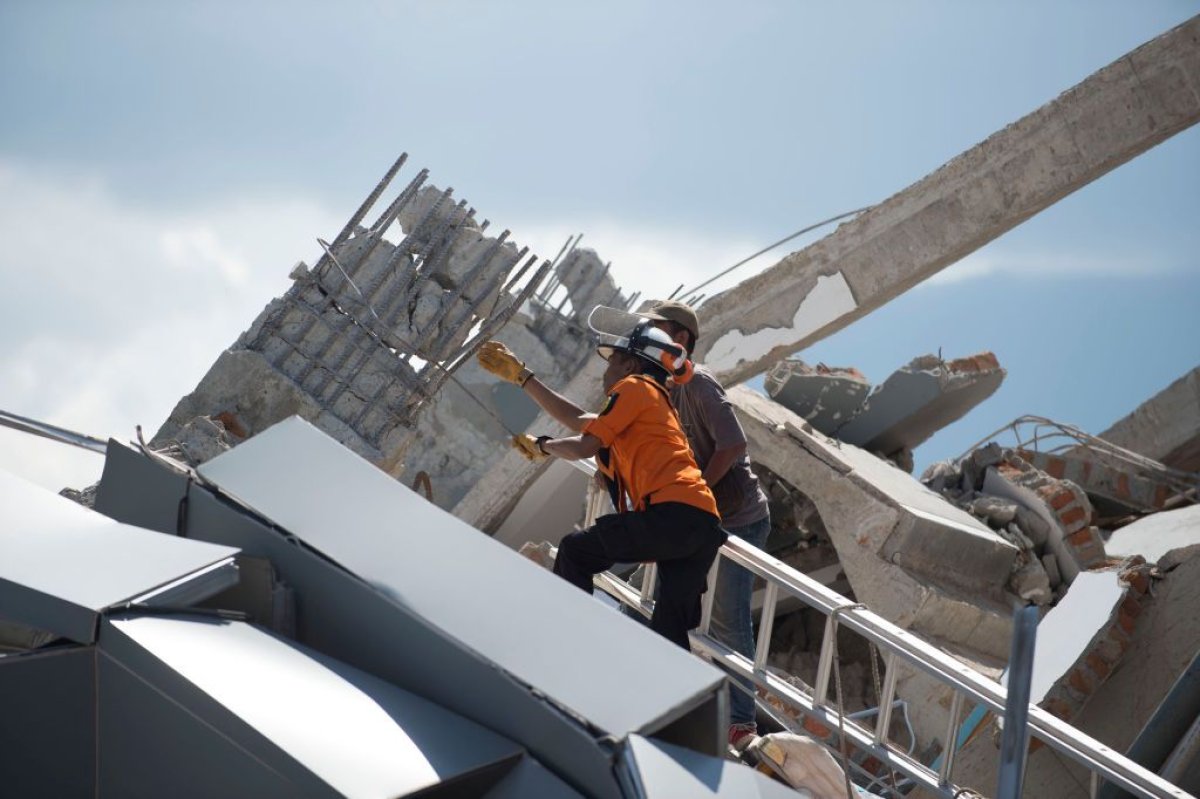The death toll from Friday's earthquake and tsunami in Indonesia's Sulawei island soared Sunday, with 832 now confirmed dead.
Dozens of people were reported to be trapped in the rubble of two hotels and a mall in the city of Palu, which was hit by waves as high as 20 feet following the 7.5 magnitude earthquake on Friday.

A young woman was pulled alive from the rubble of the Roa Roa Hotel, the news website Detik.com reported. Hotel owner Ko Jefry told Metro TV on Saturday that up to 60 people were believed trapped. Hundreds of people gathered at the mall searching for loved ones.
"What we now desperately need is heavy machinery to clear the rubble. I have my staff on the ground, but it's impossible just to rely on their strength alone to clear this," Muhammad Syaugi, head of the national search-and-rescue agency, told AFP news agency.
With most of the confirmed deaths from Palu, authorities are bracing for much worse as reports filter in from outlying areas, in particular, Donggala, a region of 300,000 people north of Palu and closer to the epicenter of the quake, and two other districts.
Vice President Jusuf Kalla said the toll could rise into the thousands.
National disaster mitigation agency spokesman Sutopo Purwo Nugroho told a news conference the affected area was bigger than initially thought, though rescuers only had good access to one of four affected districts - Palu.
"We haven't received reports from the three other areas. Communication is still down, power is still out. We don't know for sure what is the impact," he said.
"There are many areas where the search and rescue teams haven't been able to reach," Nugroho said, adding that teams needed heavy equipment to move broken concrete.
Five foreigners - three French, one South Korean and one Malaysian - were among the missing, he said. The 832 fatalities included people crushed in collapsing buildings and swept to their death by tsunami waves.
Donggala town has been extensively damaged, with houses swept into the sea and bodies trapped in debris, according to a Metro TV reporter on the scene.
The Red Cross said it had heard nothing from the Donggala region, and estimates that as many as 1.6 million people were affected by the earthquake.
"This is extremely worrying," it said in a statement.
"This is already a tragedy, but it could get much worse."
National search and rescue agency chief Muhammad Syaugi told Reuters rescuers were flying to Donggala by helicopter.
Finance Minister Sri Mulyani Indrawati said the government had allocated 560 billion rupiah ($37.58 million) for disaster recovery, media reported.
Indonesia is all too familiar with deadly earthquakes and tsunamis. In 2004, a quake off Sumatra island triggered a tsunami across the Indian Ocean, killing 226,000 people in 13 countries, including more than 120,000 in Indonesia.
Questions are sure to be asked why warning systems set up around the country after that disaster appear to have failed on Friday.
The meteorological and geophysics agency BMKG issued a tsunami warning after the Friday quake but lifted it 34 minutes later, drawing criticism it had withdrawn it too quickly. But officials said they estimated the waves had hit while the warning was in force.
Uncommon Knowledge
Newsweek is committed to challenging conventional wisdom and finding connections in the search for common ground.
Newsweek is committed to challenging conventional wisdom and finding connections in the search for common ground.
About the writer
To read how Newsweek uses AI as a newsroom tool, Click here.








